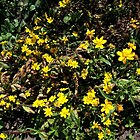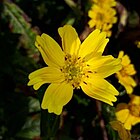Note: This is a project under development. The articles on this wiki are just being initiated and broadly incomplete. You can Help creating new pages.
Difference between revisions of "Guizotia abyssinica"
| (2 intermediate revisions by the same user not shown) | |||
| Line 1: | Line 1: | ||
[[File:GingellikkruidBloem2.jpg|thumb|right]] | [[File:GingellikkruidBloem2.jpg|thumb|right]] | ||
| + | '''Guizotia abyssinica''' is a stout, erect annual herb growing up to 2 metres tall. The root system is well developed, with a taproot and many lateral roots, particularly in the upper 5cm. Niger seed is often harvested as a source of a good quality oil; it also provides an edible seed, and has local medicinal uses. | ||
==Uses== | ==Uses== | ||
| − | {{Uses|}}, {{Uses|}}, {{Uses|}}, {{Uses|}}, {{Uses|}}, {{Uses| | + | {{Uses|Syphilis}}, {{Uses|Burns}}, {{Uses|Rheumatism}}, {{Uses|Scabies}}, {{Uses|Cough}}, {{Uses|Brain disease}}.<ref name="Uses"/> |
==Parts Used== | ==Parts Used== | ||
| Line 10: | Line 11: | ||
==Common names== | ==Common names== | ||
| − | {{Common names|sa=|en=|gu=|hi=|kn=|ks=|ml=|mr=|pa=|ta=|te=}} | + | {{Common names|sa=|en=Blackseed|gu=|hi=Ramtil|kn=Huchchellu|ks=|ml=|mr=Karal|pa=|ta=Payellu|te=Valesulu}} |
==Properties== | ==Properties== | ||
| Line 28: | Line 29: | ||
==Habit== | ==Habit== | ||
| − | {{Habit|}} | + | {{Habit|Annual}} |
==Identification== | ==Identification== | ||
| Line 47: | Line 48: | ||
==Mode of Propagation== | ==Mode of Propagation== | ||
| − | {{Propagation|}} | + | {{Propagation|Seeds}} |
==How to plant/cultivate== | ==How to plant/cultivate== | ||
| − | <ref name="How to plant/cultivate"/> | + | An easily grown plant, it succeeds in any rich soil. The plant is adapted to a wide range of soils, from sandy to heavy, growth being poor on light sandy or gravelly soils.<ref name="How to plant/cultivate"/> |
==Commonly seen growing in areas== | ==Commonly seen growing in areas== | ||
| − | {{Commonly seen|}}, {{Commonly seen| | + | {{Commonly seen|Open waste places}}, {{Commonly seen|Waste ground near oil mills}}. |
==Photo Gallery== | ==Photo Gallery== | ||
| Line 66: | Line 67: | ||
<references> | <references> | ||
| − | <ref name="chemical composition">[ | + | <ref name="chemical composition">[Chemistry]</ref> |
| − | <ref name="Leaf">[ | + | <ref name="Leaf">[Morphology]</ref> |
| − | <ref name="How to plant/cultivate">[ | + | <ref name="How to plant/cultivate">[https://pfaf.org/user/Plant.aspx?LatinName=Guizotia+abyssinica Cultivation]</ref> |
<ref name="Uses">Indian Medicinal Plants by C.P.Khare</ref> | <ref name="Uses">Indian Medicinal Plants by C.P.Khare</ref> | ||
</references> | </references> | ||
==External Links== | ==External Links== | ||
| − | * [ ] | + | * [https://pfaf.org/user/Plant.aspx?LatinName=Guizotia+abyssinica Guizotia abyssinica on pfaf.org] |
| − | * [ ] | + | * [https://www.sciencedirect.com/topics/agricultural-and-biological-sciences/guizotia-abyssinica Guizotia abyssinica on sciencedirect.com] |
| − | * [ ] | + | * [http://www.flowersofindia.net/catalog/slides/Ramtil.html Guizotia abyssinica on flowersofindia.net] |
[[Category:Herbs]] | [[Category:Herbs]] | ||
[[Category:Pages without herbs images]] | [[Category:Pages without herbs images]] | ||
Latest revision as of 13:26, 14 May 2020
Guizotia abyssinica is a stout, erect annual herb growing up to 2 metres tall. The root system is well developed, with a taproot and many lateral roots, particularly in the upper 5cm. Niger seed is often harvested as a source of a good quality oil; it also provides an edible seed, and has local medicinal uses.
Contents
- 1 Uses
- 2 Parts Used
- 3 Chemical Composition
- 4 Common names
- 5 Properties
- 6 Habit
- 7 Identification
- 8 List of Ayurvedic medicine in which the herb is used
- 9 Where to get the saplings
- 10 Mode of Propagation
- 11 How to plant/cultivate
- 12 Commonly seen growing in areas
- 13 Photo Gallery
- 14 References
- 15 External Links
Uses
Syphilis, Burns, Rheumatism, Scabies, Cough, Brain disease.[1]
Parts Used
[[:Category:Herbs with used in medicine|]], stem, leaves, Root.
Chemical Composition
Common names
| Language | Common name |
|---|---|
| Kannada | Huchchellu |
| Hindi | Ramtil |
| Malayalam | |
| Tamil | Payellu |
| Telugu | Valesulu |
| Marathi | Karal |
| Gujarathi | |
| Punjabi | |
| Kashmiri | |
| Sanskrit | |
| English | Blackseed |
Properties
Reference: Dravya - Substance, Rasa - Taste, Guna - Qualities, Veerya - Potency, Vipaka - Post-digesion effect, Karma - Pharmacological activity, Prabhava - Therepeutics.
Dravya
Rasa
Guna
Veerya
Vipaka
Karma
Prabhava
Habit
Identification
Leaf
| Kind | Shape | Feature |
|---|---|---|
Flower
| Type | Size | Color and composition | Stamen | More information |
|---|---|---|---|---|
| {{{5}}} |
Fruit
| Type | Size | Mass | Appearance | Seeds | More information |
|---|---|---|---|---|---|
Other features
List of Ayurvedic medicine in which the herb is used
Where to get the saplings
Mode of Propagation
How to plant/cultivate
An easily grown plant, it succeeds in any rich soil. The plant is adapted to a wide range of soils, from sandy to heavy, growth being poor on light sandy or gravelly soils.[4]
Commonly seen growing in areas
Open waste places, Waste ground near oil mills.
Photo Gallery
References
- ↑ Indian Medicinal Plants by C.P.Khare
- ↑ [Chemistry]
- ↑ [Morphology]
- ↑ Cultivation
External Links
- Ayurvedic Herbs known to be helpful to treat Syphilis
- Ayurvedic Herbs known to be helpful to treat Burns
- Ayurvedic Herbs known to be helpful to treat Rheumatism
- Ayurvedic Herbs known to be helpful to treat Scabies
- Ayurvedic Herbs known to be helpful to treat Cough
- Ayurvedic Herbs known to be helpful to treat Brain disease
- Herbs with used in medicine
- Herbs with stem used in medicine
- Herbs with leaves used in medicine
- Herbs with Root used in medicine
- Herbs with common name in Kannada
- Herbs with common name in Hindi
- Herbs with common name in Tamil
- Herbs with common name in Telugu
- Herbs with common name in Marathi
- Herbs with common name in English
- Habit - Annual
- Index of Plants which can be propagated by Seeds
- Herbs that are commonly seen in the region of Open waste places
- Herbs that are commonly seen in the region of Waste ground near oil mills
- Herbs
- Pages without herbs images




